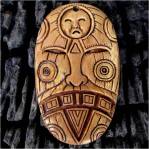An Anasazi Story by Jeff Posey.
The matron of the hot spring inspected new people as they arrived and assigned them a reed mat, a cloth of cotton, and a robe of cotton or animal skins, depending on their rank. When an arrival impressed her, she bestowed the buffalo robe to them.
When the latest old man came to soak in the hot water, she watched to see if he behaved as if a crazy spirit had replaced him, or if he carried himself with lucid wisdom. This one seemed aloof to the physical things going on around him, yet completely aware.
She handed the buffalo robe to him.
“I’m not worthy of a top robe,” he said. “I just wish to lie in the warmth and watch the sky for a few days.” He coughed and cleared his throat and struggled with his next words. “And wait for my grandson to return.”
The matron offered the robe to the old man’s companions, an unusual albino woman and a boy. The albino woman took it with a grateful nod. The boy turned and gazed at the highest mountain north of the hot spring.
The matron had seen this before. Old men from all the surrounding clans would bring their sons or grandsons to climb the peak of the mother of hot water, while they suspended their bodies and spirits in the fragrant waters and mud of the springs.
“He’s older than he looks,” the albino woman, called Nuva for “snow,” told the matron. They watched the boy, Tuwa, set off for the mountain in the first dim light of the next morning.
“I’ve seen smaller boys go to the mountain,” said the matron.
“Do they all return?”
“Most,” she said. “Very few fail. It is more difficult than dangerous. I myself have been close to the top.” She didn’t want to alarm this odd white woman who tended the regal old man. People who became panicked because their sons and grandsons did not return invariably failed to pay her, which meant less food and meat and clothing for her family.
When she learned they were from the Village of the Twin War Gods, and that Grandfather was its famous Sky Chief, she quietly made the other soakers leave the big pool to Grandfather alone. He lay in the heat with his head propped on folded animal skins and watched the sky without speaking.
Finally, the boy returned, staggering and babbling wildly, and the matron tried to appear to leave them in private while staying close enough to overhear. His story had more profound meaning than most, and she shrank from the blasphemy Grandfather spoke against Másaw, the great spirit preferred by the High Priest of Totec Canyon. Glad that no warriors were here from the canyon, she helped clean the mud from the old sky watcher and dry him off to prepare for their return walk to the Twin War Gods. She felt no personal allegiance to Totec Canyon and its new religion, but trouble would hurt her trade.
The Sky Chief approached the matron with a self-effacing bow. “You have helped the bones of this old man,” he said, and handed her a small plain pouch.
When they were on their way and out of sight, she shook the contents of the pouch into her hand: fifty well-worked turquoise beads. She quickly poured them back into the pouch and hid it between her breasts. She’d never received a richer payment.
She looked around, but no one watched her with any particular attention, and she thought about the boy’s story and the interpretation by his grandfather. Someday, she thought, this will become a problem. But she also felt obliged to the old sky watcher, his grandson, and the albino woman. Their generosity demanded it. She squinted in the bright sunlight to watch three new people approach her spring. People will always come here, she told herself. Regardless of changing leaders and religion and the unspeakable acts of warriors she heard whispered by her visitors. She just hoped that all of it left her spring and her people alone.
When the new visitors arrived, a skinny-legged old man, a woman, and a boy who said, “This place smells funny,” she handed the old man a worn cotton robe.
# # #
These are the hot springs of Pagosa Springs, Colorado, and the Village of the Twin War Gods is the nearby Chimney Rock archaeological area. The peak climbed by the boy is Pagosa Peak, north of Pagosa Springs. “Pah-gosa” is Ute for “water boiling.”



